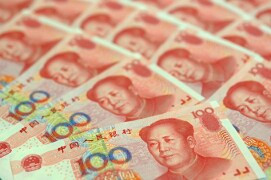
The Chinese yuan is strengthening on Tuesday as the federal government continues to talk up the currency, despite bearish sentiment from foreign investors surrounding the worldâs second-largest economy. As the US-China trade war escalates, there are fears that not only will the Chinese economy continue to spiral downwards, but also the global economy will contract.Â
Speaking in an interview with the Peopleâs Bank of China (PBOC)âs Financial News, Pan Gongsheng, chief of the State Administration of Foreign Exchange (SState Administration of Foreign Exchange (S, hinted that the country is unlikely to allow the currency to fall below the crucial 7.00 against the US dollar. The top foreign exchange regulator said on Sunday said that the economic fundamentals and consumer confidence remain strong, but the trade war has applied pressure to the yuan.Â
We absolutely have the fundamentals, the confidence and the ability to keep Chinaâs foreign exchange market stable and keep the yuan exchange rate at a reasonable and balanced level.Â
The last time the yuan slipped below 7.00 was in 2008 at the start of the global financial crisis.Â
Regional economic data suggest that the local markets are performing quite well, reports China Daily.Â
According to the newspaper, a majority of the 31 provinces, municipalities, and autonomous areas recorded strong gross domestic product (GDP) growth that was higher than the national average of 6.4%. For instance, the Yunnan Province reported 9.7% GDP growth, Guizhou Province posted a 9.2% boost, and the Tibet autonomous region enjoyed a 9.1% jump.Â
The numbers showed the equipment manufacturing, service, Internet, and finance industries led the growth.Â
It has been more than a week since China imposed retaliatory tariffs on US goods, totaling $60 billion on more than 5,000 products. With no end in sight, Wall Street is sounding the alarm about a downturn in the global economy, warning that the prolonged trade dispute could trigger a recession.Â
Morgan Stanley believes that if no deal is agreed upon and Washington institutes a 25% tariff on the remaining $300 billion of Chinese imports, then the Federal Reserve could cut interest rates back down to zero. Â
Chetan Ahya, Morgan Stanleyâs chief economist, told CNBC:Â
But, a reactive policy response and the usual lags of policy transmission would mean that we might not be able to avert the tightening of financial conditions and a full-blown global recession.Â
On the data front, investors will look ahead to industrial profits, manufacturing, and foreign exchange reserves.Â
The USD/CNY currency pair tumbled 0.14% to 6.9023, from an opening of 6.9123, at 17:01 GMT on Tuesday. The EUR/CNY plummeted 0.18% to 7.7040, from an opening of 7.7179.Â
If you have any questions, comments, or opinions regarding the Chinese Yuan, feel free to post them using the commentary form below.